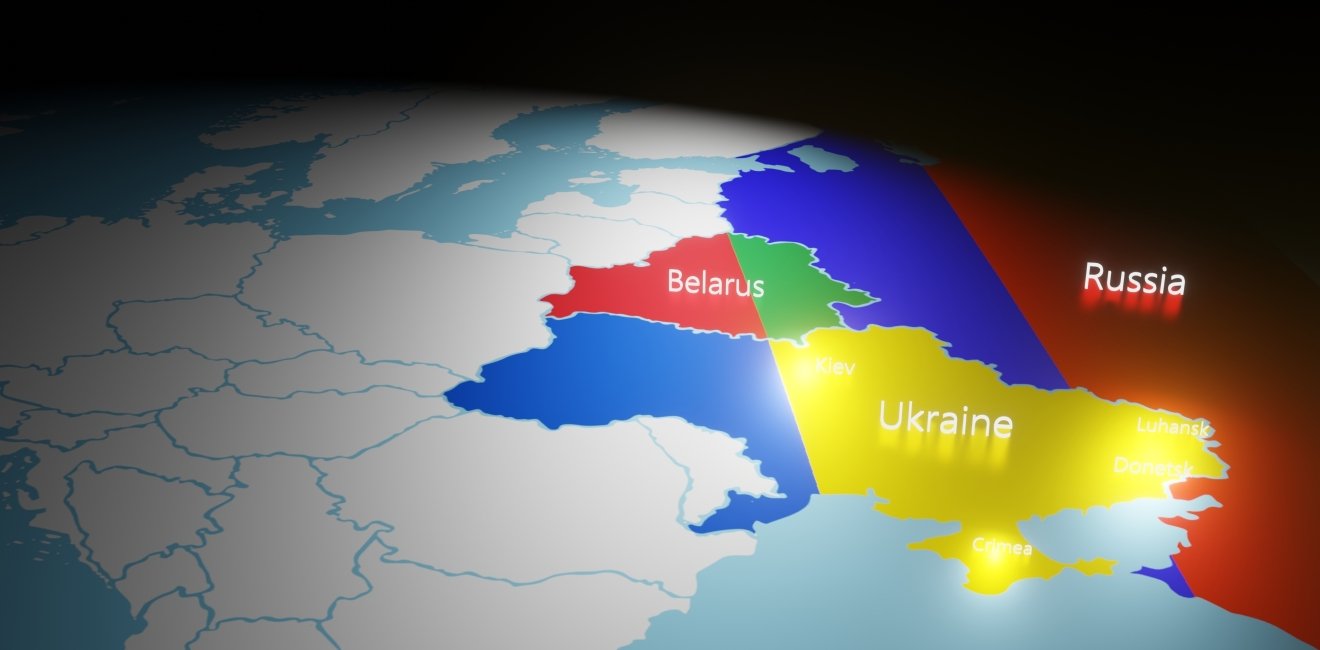
A blog of the Kennan Institute
BY ALLA LEUKAVETS
While everyone’s attention is focused on the dramatic events unfolding in Ukraine, the West should not forget that the Kremlin is currently waging two wars, one in Ukraine and another in Belarus, though by different means. Whereas Ukraine is presently under military attack from Russia, Belarus is being “softly” occupied without the Kremlin having to fire a single shot. Even if Putin does not succeed in overtaking Ukraine, it can be argued that Belarus under President Aliaksandr Lukashenka is quickly turning into an extension of Russian territory. It is crucial that Lukashenko’s regime not be equated with the rest of Belarus and that the pro-democratic Belarusian movement and its antiwar efforts be supported by the West.
Russia has been developing very close political, economic, and military ties to Belarus since the early 1990s. Russia’s major interests in Belarus are twofold. First, Belarus is important for Russia in economic terms, as it serves as a transit route for over 20 percent of Russia’s energy exports to the EU.
Second, Belarus is crucial for Russia’s security policy. Belarus is the shortest way to Russia’s Kaliningrad oblast through the so-called Suwalki corridor, a sixty-five mile long strip of land on the Polish-Lithuanian border that provides Russia with access to the Baltic Sea but is not under Russian control. Belarus also has a long border with Ukraine and has recently served as a launching pad for Russia’s expansionist policy in the region.
With these interests in mind, Russia has always been keen to retain control over Belarus. It has done so by creating a “sponsored authoritarianism” model and by increasing Belarusian dependence on Russia.
Although both countries have often acknowledged the strategic nature of their partnership, their relations have not always been friendly. The tensions between Belarus and Russia became particularly visible after the 2014 crisis in Ukraine, when Belarus started to significantly improve relations with the West. Officially, Minsk acted as a mediator in the Ukrainian crisis and did not recognize Russia’s annexation of Crimea. These attempts at a multivectoral foreign policy resulted in a significant worsening of Belarus-Russia relations that lasted up until the 2020 presidential elections in Belarus.
Since the outbreak of the protests against voting irregularities in the 2020 presidential election, however, Lukashenka has been demonstrating more loyalty to Putin. The Kremlin used the election crisis as leverage to put the weakened Lukashenka more firmly in its control and began increasing its economic, political, and military presence in Belarus.
Lukashenka’s economic dependence on the Kremlin has grown substantially since the 2020 protests. Being under sanctions from the West, Lukashenka has been forced to turn to Putin for financial support to ensure his survival in office. Lukashenka received generous loans from Putin in 2020–2022 that further deepened his economic dependence on the Kremlin and made diversification of the Belarusian trade and credit portfolio difficult.
Lukashenka has also made significant political concessions to the Kremlin. He has considerably deepened Belarus-Russia relations within the Union State (something he has avoided doing over the past twenty years) and also revoked Belarus’s neutral stance on Crimea by recognizing the peninsula as a de facto part of Russian territory.
Finally, and most important, Lukashenka has made considerable military concessions to Russia. He began to increase Belarus’s military cooperation with Russia immediately after the 2020 postelectoral crisis. In September 2021, Belarus and Russia held large-scale military exercises (Zapad-2021) and established a joint military training center in the Belarusian city of Hrodna, located on the border with NATO member Poland. In November 2021 the two states adopted a new military doctrine within the Union State of Russia and Belarus that emphasized the need for closer bilateral cooperation.
Furthermore, immediately prior to Russia’s invasion of Ukraine on February 24, 2022, Lukashenka allowed the Russian armed forces to conduct weeks-long military drills on Belarusian territory. The exercises, dubbed Allied Resolve 2022, allowed Russia to transport its military equipment and troops to Belarusian territory close to the Ukrainian border. According to a NATO report, by February 24 Russian combat forces in Belarus amounted to 30,000.
Moreover, Lukashenka did not object to Putin using the territory of Belarus as a launching pad for the invasion of Russian troops into Ukraine that started on February 24. Since then, there have been numerous reports of aircraft and missile launches from Belarus toward Ukraine, including Iskander missile systems capable of launching ballistic and cruise missiles.
Finally, as a result of the recent constitutional referendum held on February 27, Belarus has revoked its nuclear-free status and official stance of neutrality. Both amendments are advantageous for the Kremlin in its attempt to exert greater control over Belarus and serve to demonstrate Lukashenko’s loyalty to Putin. In one of his recent interviews, Lukashenka said that most of Belarus’s former nuclear weapons facilities, which used to house and launch Soviet SS-25 missiles, remain in place and, if needed, are ready to host Russian nuclear weapons.
To what extent can Belarus under Lukashenka become an explicit participant in the Russia-Ukraine war? The recent resignation of Deputy Defense Minister Viktar Gulevich, who stated that his personnel do not want to take part in the Russian invasion of Ukraine, indicates that not all pro-Lukashenka Belarusians support Russia’s aggressive actions in Ukraine. Another example is the resignation of Belarusian diplomat Natalia Khvostova, posted to the consulate of Belarus in Munich, who stepped down in protest of the ongoing invasion of Ukraine. These resignations show that the Belarusian elites do not represent a monolithic structure and that the war in Ukraine can become a trigger for further elite defections. In addition, it has been reported that there is a great deal of demoralization among Belarusian conscripted soldiers, who do not want to participate in the Russia-Ukraine war. These developments indicate that Lukashenka might face a domestic backlash in the case of full-scale involvement of Belarusian forces in the Russia-Ukraine war and that he will be cautious about taking further steps in this direction.
Antiwar sentiment is also very strong among many ordinary Belarusians, and they have resisted the Ukraine-Russia war in several ways.
First, a significant number of young people of recruitment age have been fleeing Belarus to avoid participating in the war. On February 27, the day of the referendum, hundreds of Belarusians, including mothers of young conscripts, took to the streets with antiwar slogans to demonstrate solidarity with Ukraine.
Second, Belarusian IT specialists, who have been a strong driving force during the 2020 postelection protests, have also joined the resistance against Russia’s war in Ukraine. The activist hackers, who call themselves Cyber Partisans, recently breached the computers that control Belarus’s trains and brought some of them to a halt. This action disrupted the transit of Russian soldiers and military equipment to Ukraine.
Third, Belarusians have recently formed a group, the Belarusian Volunteers, that assists Belarusian men who wish to join the Ukrainian resistance and fight against Russia. According to the Telegram channel of this group, its membership is growing rapidly, and the newly recruited candidates undergo intensive training before participating in military activities.
Finally, the office of Belarusian opposition leader Sviatlana Tsikhanouskaya founded an antiwar movement on March 1, 2022. The main goals of this movement are to provide assistance to Belarusians in Ukraine, fight disinformation and propaganda about Belarusian involvement in Ukraine’s crisis, and prevent the Belarusian regime from helping Russia in its aggression against Ukraine.
Belarus cannot be equated with the Lukashenka regime, and ordinary Belarusians should be treated on par with Ukrainians for their fight against Russian military aggression in Ukraine. Some measures to aid equal treatment include avoiding discriminating against Belarusians in visa policy (something that Estonia has recently done by closing its visa center and halting the e-residency scheme for citizens of Belarus), providing temporary protected status to those in need, treating students from both countries equally, and supporting antiwar civic initiatives.
It is crucial that the West calibrates its approach to Belarus. It should support the antiwar initiatives of the democratic Belarusian movement and penalize the Lukashenka regime for a vital role it has played in Russia’s aggression in the region. The future of democratic Belarus may well depend on it.
The opinions expressed in this article are those solely of the authors and do not reflect the views of the Kennan Institute.
Author

Post-doctoral Researcher, Stockholm Center for Eastern European Studies

Kennan Institute
The Kennan Institute is the premier US center for advanced research on Eurasia and the oldest and largest regional program at the Woodrow Wilson International Center for Scholars. The Kennan Institute is committed to improving American understanding of Russia, Ukraine, Central Asia, the South Caucasus, and the surrounding region through research and exchange. Read more

Explore More in Focus Ukraine
Browse Focus Ukraine
Talking to the Dead to Heal the Living

Ukrainian Issue in Polish Elections


